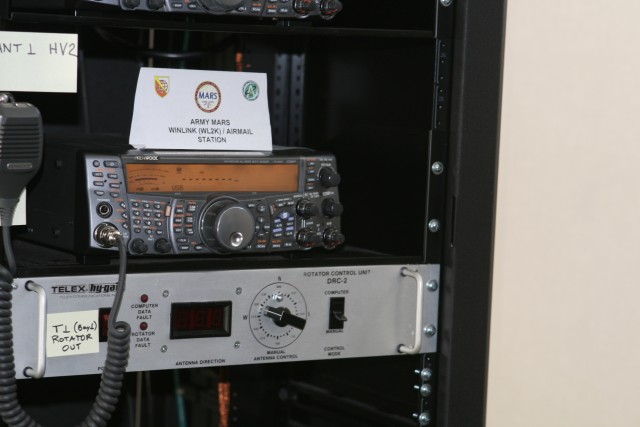Fort Huachuca is home to the only U.S. Army Military Affiliate Radio System in the world.
Army MARS, a Department of Defense program, provides emergency communications for the military. It is designed to support national and state emergency communications, provide health and welfare, and promote the art and science of radio.
Fort Huachuca hasn't always been the home to MARS, explaied Grant Hays, chief of Army MARS operations.
"Years ago every military installation had a MARS station because that was their back-up communications in case of a nuclear attack," he said, noting that in the 90s there was a merging of things and so MARS ended up consolidating at Fort Huachuca.
Jim Griffin, chief of the Army MARS program, explaied Fort Huachuca was chosen as a home for MARS because it is part of Network Enterprise Technology Command, which is headquartered here.
MARS involves many government entities, including U.S. Army Strategic and Pacific commands, various military units in the U.S., Transportation Security Administration, Federal Emergency Management Agency, and the Department of Homeland Security.
"MARS [exists] in the event that the infrastructure is not there," Hays explained. "The genesis of this activity goes back to [Hurricane] Katrina, when the infrastructure was completely wiped away and people began to wonder how would we communicate if we didn't have the Internet or cellphones."
Griffin noted the presence of the MARS station benefits Fort Huachuca because it puts the installation on the map as an alternative for communications. The station has also supported other on-post commands during exercises and testing.
The station operates nine hours each day and seven days per week. In case of an emergency, the station would be contacted via radio, MARS would put the word out, and activate their staff and other agencies.
Four radio operators man the station here.
"The operators are the police of the radio waves," said Juanita Portz, station operator. Operators check into regional networks, control certain frequencies during the time period allowed for people to talk, and they monitor the MARS Winlink to airmail. According to www.winlink.org, Winlink is worldwide system of volunteer resources supporting e-mail by radio, with non-commercial links to Internet e-mail.
"We generally do not rely on the Internet," Griffin says. "We have it and use it a lot, but the core of our operations is to use the radio."
"A lot of people think of high frequency radio as all voice; we do a lot of voice operations, but that's generally for telling somebody to move to a certain frequency," Hays said.
Information is moved via radio using the new digital systems. The actual information, such as photographs, is sent via digital means. MARS uses computers attached to the radios, so information goes over the airwaves and not on a local area network line like the Internet.
"We are able to combine radio and the Internet, and that's what makes it very valuable because the Internet probably won't be out everywhere in the United States at the same time. But it will be out, as we saw with Katrina, in certain areas," Hays explained.
Radio e-mail systems allow MARS personnel to "jump" over to those areas where the Internet is not available and connect to where it is available, allowing them to continue to serve those people in those areas that don't have it.
"People are beginning to realize the Internet is not the total solution," Hays noted. "There are times when, even though the Internet may be there, we may choose not to use because it is vulnerable, and you need to be in a position where you have a lot of tools you can use in the tool box."
There are thousands of MARS members throughout the world who give their time, effort and money to support the system and provide a huge network that could be available for the station personnel at Fort Huachuca to use.
"We're doing this because each and every one of us has a real commitment to providing emergency communications, and all of us believe that this is a viable system that needs to be used," Hays says, adding, "that's why we spend our time doing this."




Social Sharing